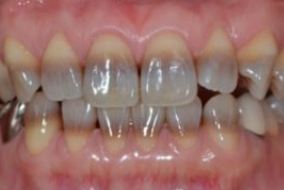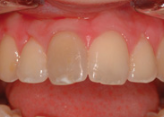Tooth Discoloration can be caused by problems with tooth enamel formation, or issues within the tooth itself. Such yellowing or browning can be due to drinking certain beverages or eating foods that are associated with staining. Some medications, such as Tetracyclin, or chemicals ingested by young children and pregnant women, may disrupt tooth enamel development. This can result in the tooth becoming pitted, mottled, and/ or discolored.
Dental discoloration may also be due to necrosis within the tooth, or one that is chronically infected. Such teeth may take on a uniform grayish color. When this stage is reached, the underlying infection must be treated, and afterward the color may be corrected by restoration, which may include bleaching.
The most simple forms of tooth discoloration come from staining caused by tobacco use, smoking, and using certain foods and beverages. The placement of porcelain veneers, professional and thorough cleanings, and the use of tooth whitening procedures can all help manage tooth discoloration. These techniques will impede the discoloration and restore original whiteness and brightness to the tooth.
There are only 9 dental specialties recognized by the American Dental Association (ADA). Note that cosmetic dentistry, in itself is not a specialty but, falls under the category of prosthodontics. Feel free to call Dr. Huang, a dual-board certified prosthodontist, for a second opinion. You will sleep better at night!
Nova Premier Dental
313 Park Ave #306 Falls Church, VA 22046
(703) 532-7586


